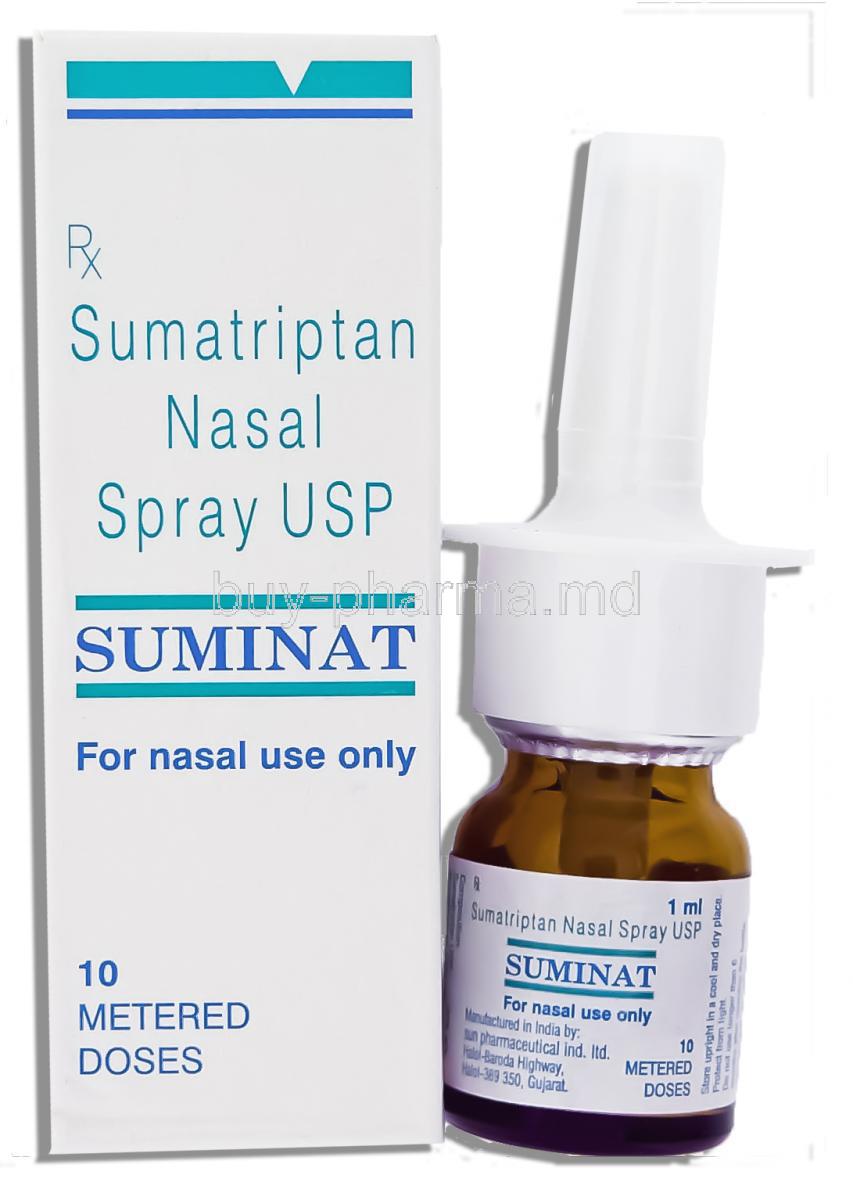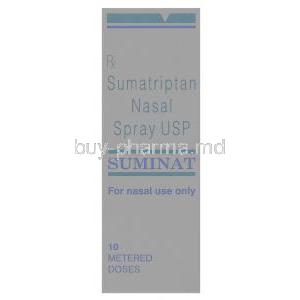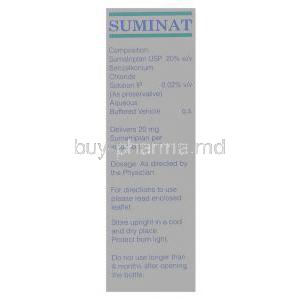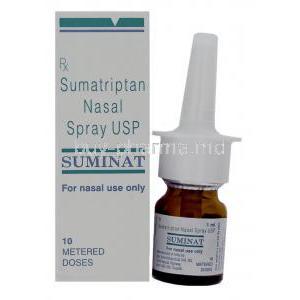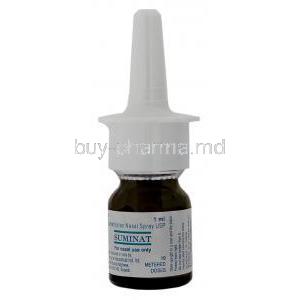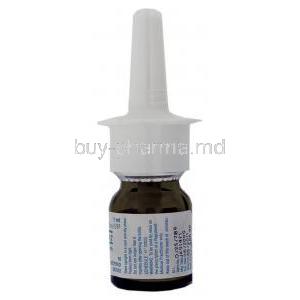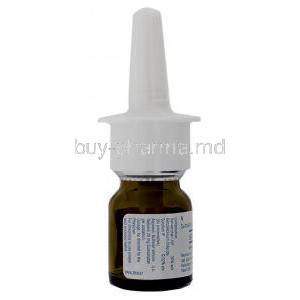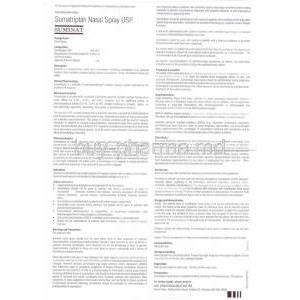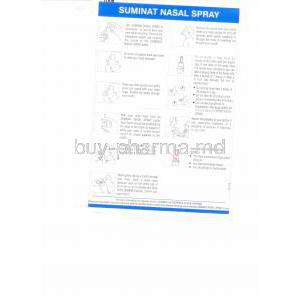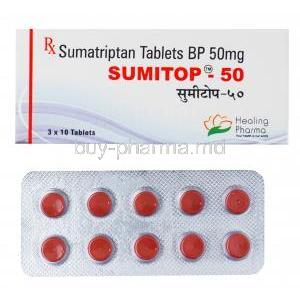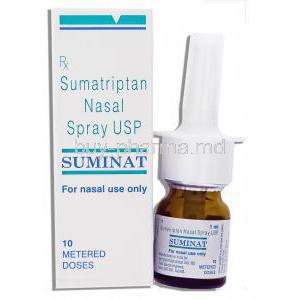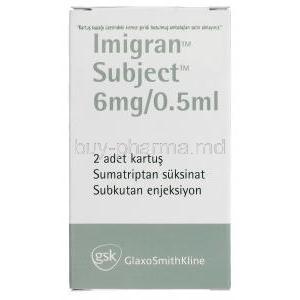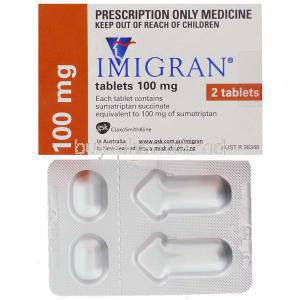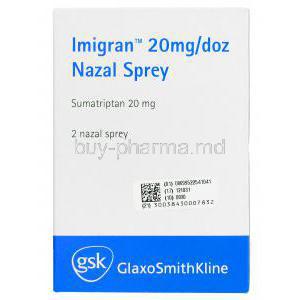Introduction to Suminat Nasal Spray
Suminat Nasal Spray is a therapeutic formulation containing Sumatriptan, a selective serotonin receptor agonist. It is primarily designed for the acute relief of migraine attacks, a neurological condition that can severely impair daily functioning. Migraines often present with throbbing unilateral pain, heightened sensitivity to light or sound, and sometimes nausea.
Treating acute migraine attacks swiftly is vital to minimize the disruption caused by these debilitating episodes. Early intervention with Suminat can shorten the duration of pain, reduce associated symptoms, and improve quality of life. Compared with oral or injectable forms, nasal spray delivery offers rapid absorption through the nasal mucosa, bypassing gastrointestinal delays and reducing invasiveness.
Composition and Formulation
The active pharmaceutical ingredient is Sumatriptan succinate, a compound that acts on serotonergic pathways within the brain. It is formulated in a metered-dose nasal spray device to ensure precise delivery.
- Available in different strengths to accommodate varying therapeutic needs
- Convenient single-use packaging that maintains sterility
- Inactive ingredients include stabilizers and buffering agents that enhance absorption and maintain chemical stability
Sumatriptan and ibuprofen
Sumatriptan is a triptan that works on serotonin receptors to relieve migraines, while ibuprofen is a nonsteroidal anti-inflammatory drug (NSAID) that reduces pain and inflammation.
Sumatriptan and lexapro
Taking sumatriptan (a migraine medication) and Lexapro (an antidepressant) together can increase the risk of a serious condition called serotonin syndrome, which involves high serotonin levels and symptoms like confusion, agitation, increased heart rate, sweating, and muscle problems.
Rizatriptan vs sumatriptan
Pain relief is typically faster with Rizatriptan rather than with Sumatriptan. A 10 mg Rizatriptan dosage may be expected to take effect in as little as 30 minutes. The Sumatriptan dosage is significantly higher at 100 mg, typically taking nearer to an hour to offer effective relief from migraine symptoms
Ubrelvy vs sumatriptan
Ubrelvy (ubrogepant) is a CGRP receptor antagonist that is safer for people with heart conditions, while sumatriptan (Imitrex) is a triptan that is a first-choice treatment but can cause dangerous heart-related side effects. Ubrelvy works differently and is a good option if sumatriptan is not suitable. Both are oral medications used for acute migraine attacks, but sumatriptan is also available as a nasal spray and injection.
Nurtec vs sumatriptan
Nurtec (rimegepant) is a CGRP receptor antagonist for acute migraine treatment and prevention, while sumatriptan (Imitrex) is a triptan for acute treatment only, with faster-acting forms available
Naratriptan vs sumatriptan
Sumatriptan can be taken again 2 hours after the first dose if needed, but naratriptan requires a 4-hour wait before a second dose. Sumatriptan starts working within about 2 hours, whereas naratriptan can take up to 3 or 4 hours to reach its maximum effect.
Frovatriptan vs sumatriptan
Frovatriptan has a longer half-life compared to Sumatriptan, which means its effects last longer. It is often used for menstrual migraines due to this characteristic. On the other hand, Sumatriptan acts faster but its effects do not last as long.
Mechanism of Action: How Suminat Nasal Spray Works
Sumatriptan functions as an agonist at 5-HT1B and 5-HT1D receptors. By stimulating these receptors, it addresses the vascular and neurological mechanisms believed to underlie migraine attacks.
- Vasoconstriction: Constriction of dilated intracranial blood vessels reduces the pulsating pain characteristic of migraine.
- Neural Inhibition: Suppresses activity within the trigeminal nerve complex, a key mediator of migraine pain transmission.
- Symptom Relief: Helps diminish associated manifestations including nausea, photophobia, and phonophobia.
Suminat Uses
Suminat Nasal Spray has established efficacy in:
- Acute migraine attacks with or without aura
- Cluster headaches in specific patient populations
- Reducing nausea and vomiting related to migraines
It is not indicated for prophylactic use, but rather as an abortive treatment when a migraine episode begins.
Off-Label Uses of Sumatriptan
Though primarily licensed for migraine, clinical interest extends to other conditions:
- Menstrual migraine: Short-term use during perimenstrual periods
- Vestibular migraine: Investigated for dizziness-dominant migraine syndromes
- Trigeminal neuralgia: Limited case studies suggesting potential benefit
- Refractory headache disorders: Considered where first-line therapies fail
Sumatriptan Dose and Administration Guidelines
The nasal spray provides a precise metered dose. Sumatriptan dose for migraine:
- Starting dose: One spray into one nostril at the onset of migraine
- sumatriptan max dose: Should not exceed prescribed limit within 24 hours
- Interval: Allow several hours before repeating a dose if necessary
- Technique: Shake gently, insert the nozzle into one nostril, and press firmly while breathing in gently
- Special advice: Suitable for patients with nausea or difficulty swallowing tablets
- If a dose is ineffective, do not exceed the recommended limit; consult a healthcare provider
Sumatriptan Side Effects
Most adverse reactions are mild and transient:
- Nasal burning, irritation, or dryness
- Unpleasant taste or throat discomfort
- Fatigue, dizziness, or drowsiness
- Nausea or mild gastrointestinal upset
Sumatriptan Adverse Effects
Though rare, some adverse effects require urgent medical attention:
- Cardiovascular: Chest pain, palpitations, elevated blood pressure
- Serotonin syndrome: Agitation, confusion, tremor, sweating when combined with serotonergic agents
- Hypersensitivity: Skin rash, swelling, anaphylaxis
- Neurological: Seizures, vision disturbances, sudden severe headache different from usual migraine
Sumatripan Interactions
Caution is essential when combining Suminat Nasal Spray with other medications:
- Contraindicated with ergotamine or ergot-type agents due to additive vasoconstrictive effects
- Increased risk of serotonin syndrome with SSRIs, SNRIs, or MAO inhibitors
- Interactions with propranolol and other cardiovascular drugs may alter drug metabolism
- sumatriptan and alcohol or CNS depressants may intensify sedation or dizziness
Sumatripan Contraindications
Certain medical conditions render the use of Suminat Nasal Spray inappropriate. These contraindications are critical to prevent severe adverse outcomes.
- History of ischemic heart disease or uncontrolled hypertension: Patients with vascular compromise or poorly managed blood pressure are at heightened risk of cardiovascular complications.
- Previous myocardial infarction, stroke, or transient ischemic attack: The vasoconstrictive properties of sumatriptan may exacerbate underlying vascular damage or precipitate recurrence.
- Severe liver impairment: Hepatic dysfunction can drastically alter drug metabolism, leading to unpredictable plasma levels and toxicity.
- Hypersensitivity: Individuals with known allergy to sumatriptan or excipients should avoid use to prevent anaphylaxis or dermatologic eruptions.
Warnings and Important Precautions
Prudent use of Suminat Nasal Spray requires adherence to several precautions. These measures safeguard patient safety and optimize therapeutic benefit.
- Cardiovascular assessment: Screening for coronary artery disease and arrhythmias is essential before initiation, particularly in at-risk populations.
- Not intended for prophylaxis: This medication is designed for acute intervention, not for long-term preventive therapy.
- Patient monitoring: Those with risk factors such as diabetes, tobacco use, or hyperlipidemia should be closely observed during therapy.
- Avoiding medication overuse: Frequent or excessive use can provoke rebound headaches, compounding the patient’s condition.
- migraine not responding to sumatriptan: If a migraine isn't responding to sumatriptan, you should contact your doctor to discuss alternative treatments, which could include a different form of sumatriptan, another type of triptan, a combination of a triptan with an NSAID, or newer medications like CGRP inhibitors. It's also possible that timing or the type of sumatriptan is the issue, and your doctor can help determine the best approach for your specific migraine attacks.
Careful Administration in Special Populations
12.1 Administration in Elderly Patients
In older adults, the likelihood of cardiovascular comorbidities increases substantially. Age-associated arterial rigidity and diminished organ reserve necessitate heightened caution.
- Baseline and periodic cardiovascular evaluations are recommended.
- Dosage should not exceed the lowest effective threshold.
- Vigilant observation for chest discomfort or arrhythmic activity is warranted.
12.2 Administration During Pregnancy and Lactation
Safety in pregnancy remains an area of limited evidence. While no conclusive teratogenic risk has been established, cautious evaluation is imperative.
- Pregnancy: Use only if the anticipated benefit outweighs potential risk to the fetus.
- Lactation: Trace amounts of sumatriptan are excreted in breast milk; temporary interruption of breastfeeding may be considered after administration.
- Comprehensive risk–benefit analysis should precede maternal use for severe migraine episodes.
12.3 Administration in Children and Adolescents
Pediatric and adolescent populations exhibit variable responses to triptan therapy. Regulatory approval may differ by jurisdiction.
- Safety and efficacy have not been uniformly established in young children.
- Dosing limitations apply to adolescents, requiring strict adherence to guidelines.
- Monitoring for neurocognitive changes or unusual behavioral effects is recommended.
Overdose Management
Exceeding recommended dosages can precipitate significant complications. Overdose manifestations may range from mild to life-threatening.
- Symptoms: Elevated blood pressure, pronounced drowsiness, syncope, or chest discomfort.
- Management: Immediate medical attention with supportive measures such as intravenous fluids and vital sign stabilization.
- No antidote: Treatment remains symptomatic, with cardiac monitoring often required.
Storage and Handling Precautions
Maintaining product integrity requires adherence to specific storage and handling practices.
- Store at controlled room temperature, away from excessive heat or moisture.
- Ensure sprays remain out of reach of children to prevent accidental ingestion or misuse.
- Dispose of used or expired sprays in accordance with pharmaceutical waste regulations.
- For travel, keep sprays in original packaging to safeguard against leakage and maintain potency.
Patient Guidance and Education
Comprehensive patient education enhances safe and effective use of Suminat Nasal Spray.
- Administer promptly at the first signs of migraine onset for optimal efficacy.
- Do not employ as a daily preventive measure; restrict use to acute episodes.
- Seek urgent medical evaluation if chest pain, severe dizziness, or unusual neurological symptoms occur.
- Incorporate lifestyle modifications such as adequate hydration, sleep regulation, and avoidance of known migraine triggers to reduce attack frequency.
Suminat Nasal Spray, Sumatriptan FAQ
- What is the use of suminat nasal spray?
- How many times a day can you take sumatriptan nasal spray?
- Is Suminat 25 safe to use?
- How quickly does sumatriptan nasal spray work?
- Can Suminat 25 raise blood pressure?
- Is sumatriptan nasal spray safe?
- Do you spray sumatriptan in both nostrils?
- Is sumatriptan nasal spray better than tablets?
- What is an alternative to sumatriptan nasal spray?
- When to take sumatriptan nasal spray?
- What happens if you take too much sumatriptan nasal spray?
- Who cannot take sumatriptan?
- Can sumatriptan put you to sleep?
- What are the side effects of sumatriptan?
- What is the best time to take sumatriptan?
- Can sumatriptan cause kidney problems?
- Why do I feel weird after taking sumatriptan?
- Is sumatriptan addictive?
- What is the drug sumatriptan used for?
- How many sumatriptan can I take in a day?
- Is sumatriptan a narcotic?
- Can sumatriptan put you to sleep?
- Who cannot use sumatriptan?
- How quickly does sumatriptan work?
- Is sumatriptan a strong painkiller?
- Can sumatriptan increase anxiety?
- How long does sumatriptan stay in your system?
- Can I take sumatriptan 3 days in a row?
- Can I take paracetamol with sumatriptan?
- What is the most common side effect of sumatriptan?
- What to avoid while taking sumatriptan?
- Can I take ibuprofen and sumatriptan?
What is the use of suminat nasal spray?
Suminat Nasal Spray is a medication used to treat migraines. It alleviates migraine symptoms and helps prevent the attack from escalating. It functions by constricting the blood vessels in the head and blocking the transmission of pain signals.
How many times a day can you take sumatriptan nasal spray?
Adults—22 milligrams (mg) (1 nosepiece in each nostril, totaling 2 nosepieces) per day. Another dose (22 mg) may be taken as long as at least 2 hours have passed since the last spray. Do not exceed 44 mg (4 nosepieces) within a 24-hour period (one day). Children—Usage and dosage must be decided by your doctor.
Is Suminat 25 safe to use?
It may not be suitable for everyone.
How quickly does sumatriptan nasal spray work?
15 minutes
Can Suminat 25 raise blood pressure?
Yes
Is sumatriptan nasal spray safe?
Sumatriptan is not suitable for some people
Do you spray sumatriptan in both nostrils?
No
Is sumatriptan nasal spray better than tablets?
The nasal spray is going to reach higher blood concentrations more quickly than that of the oral pill, which may result in faster and greater efficacy
What is an alternative to sumatriptan nasal spray?
- Ubrelvy (ubrogepant)
- Nurtec ODT (rimegepant)
When to take sumatriptan nasal spray?
Start of headache pain.
What happens if you take too much sumatriptan nasal spray?
An overdose may lead to fainting, a slower heart rate, vomiting, loss of bladder and bowel control, and drowsiness.
Who cannot take sumatriptan?
- have a heart condition like coronary heart disease, chest pain (angina), heart rhythm issues (arrhythmia) or if you’ve experienced a heart attack.
- have circulation issues in your legs (peripheral vascular disease)
- have suffered a stroke or "mini stroke" (transient ischaemic attack)
- have liver disease or other liver complications.
Can sumatriptan put you to sleep?
Yes
What are the side effects of sumatriptan?
- Fatigue
- Dizziness
- Upset stomach
- Diarrhea
- Nausea
- Drowsiness
- Muscle cramps
What is the best time to take sumatriptan?
As soon as pain starts
Can sumatriptan cause kidney problems?
Yes
Why do I feel weird after taking sumatriptan?
These may indicate an autonomic disturbance that is probably responsible for episodes of dizziness and syncope or sensations of hot and cold, shivering or sweating. Some patients have reported unusual feelings, such as depersonalization, following the use of sumatriptan.
Is sumatriptan addictive?
No
What is the drug sumatriptan used for?
Sumatriptan is utilized to alleviate the symptoms associated with migraine headaches (intense, pulsating headaches that can be accompanied by nausea or heightened sensitivity to light and sound).
How many sumatriptan can I take in a day?
Do not exceed 200 mg within any 24-hour period.
Is sumatriptan a narcotic?
No
Can sumatriptan put you to sleep?
Yes
Who cannot use sumatriptan?
- have a heart issue like coronary artery disease, chest pain (angina), heart rhythm disturbances (arrhythmia), or if you've experienced a heart attack.
- have circulation issues in your legs (peripheral vascular disease)
- have suffered a stroke or "mini stroke" (transient ischaemic attack)
- have liver disease or other liver complications.
How quickly does sumatriptan work?
Sumatriptan tablets typically take effect within 30 to 60 minutes.
Is sumatriptan a strong painkiller?
It will not alleviate any type of pain other than migraine headaches.
Can sumatriptan increase anxiety?
Yes
How long does sumatriptan stay in your system?
2.5 hours
Can I take sumatriptan 3 days in a row?
No
Can I take paracetamol with sumatriptan?
Yes
What is the most common side effect of sumatriptan?
- Feeling unwell (nausea or vomiting)
- Feeling lightheaded, unsteady, or fatigued.
- Sensations of heat or cold, with flushed cheeks.
- Irritation or burning in the nose or throat following nasal spray use.
- Nosebleeds occurring after using the nasal spray.
- Unpleasant taste in your mouth after using the nasal spray.
What to avoid while taking sumatriptan?
- Other migraine or headache medications (including ergotamine and other triptans)
- Antidepressants, such as SSRIs (selective serotonin reuptake inhibitors) or MAOIs (monoamine oxidase inhibitors)
Can I take ibuprofen and sumatriptan?
Yes

